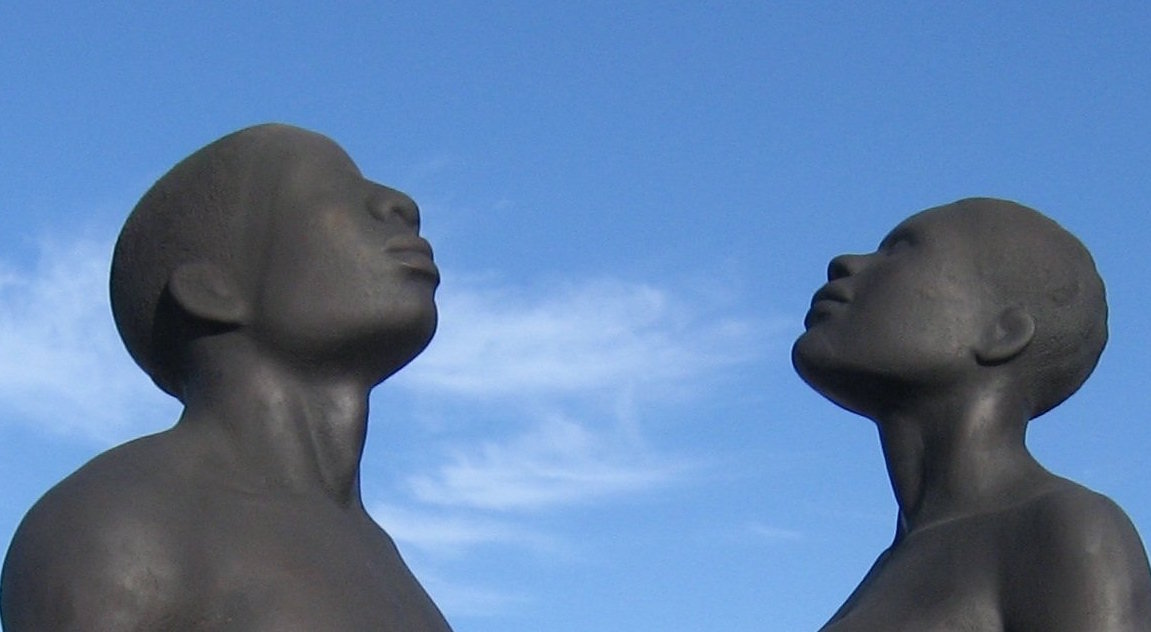Books & Culture
How I Learned to Embrace Jamaican Patois, the Language of My Youth
To get past the shame I was taught to feel about the creole I grew up with, I had to rediscover it in books

There’s something about Jamaican patois that grates and soothes at the same time. It is the language of home. It is the language of the women who lived in my childhood home as helpers, the language of the women who told me and my sisters stories about rolling calves and duppies, the women who plaited my hair morning after morning and got us girls ready for school. It is the language of my primary school classmates fashioning a ball out of an empty juice box, stuffing the empty box with other bits of trash and tapping the corners to soften the edges, then throwing that ball in a game of dandy shandy or sight—something like dodgeball—in which the child in the center jumps and weaves and bobs to avoid the ball, sometimes diving to the ground, and the children standing around watching and waiting their turn squealing and hollering as the game progressed. It is the language of the higglers in the market urging passersby to buy their produce.
But it is also the language I’ve been taught to hate, the language we were told was nothing more than broken English. It is the language that was dismissed with directives from my parents like, “Girl, don’t let me hear you talk like that”; “girl, will you please speak properly.” So languages—both the Jamaican dialect and standard English—were characters in my life, characters I either wanted to leave behind or embrace wholeheartedly.
For a long time I carried the language with me like a weighted stone.
Nicole Dennis-Benn, who embraces patois wholeheartedly in her latest novel Patsy, is the first writer I have seen who openly acknowledges the shame I had learned to associate with patois. The novel’s Patsy remarks that each character speaks patois “loudly, as though it never entered the speaker’s mind to be ashamed of it in America with all these white people around overhearing it.” Dennis-Benn is by no means the only Jamaican or Caribbean writer who uses patois, but Patsy, who has migrated to America, gives voice to what Jamaicans have long been taught and internalized: Jamaican patois is the language we leave behind, the one we tuck away lest it define who we are.
Because of my parents’ disdain for patois, for a long time I carried the language with me like a weighted stone, easily discarded in favor of the standard English my parents wanted to hear their children speak. After all, the prevailing message I generally heard was that our nation’s patois was broken English, a bastardization of the British English and British culture my parents’ and grandparents’ generations had learned to emulate. These ideas about value extended to our music: American rhythm and blues and country music were preferable to homegrown reggae. It didn’t help that reggae was seen as the music of the urban poor, their weapon against racial and economic inequities.
But my early days living in Brooklyn as a college student were a contradiction. Away from our food and language and music, I craved what we had been taught was subpar. I wanted to hear dancehall and lovers rock and ska. I wanted to hear the familiar patois that marked a stranger as one of my own. I craved the foods and words of other Caribbean islands that were so similar to Jamaica’s. While some immigrants run away from their cultures to assimilate, I ran toward mine to find myself.
I found my language in books—and I found it first in Zora Neale Hurston’s Their Eyes Were Watching God. Set in 1930’s Eatonville—a self-governing black community in Florida—Hurston’s book featured characters who spoke like the people I knew. Her characters used words like “gwan” for go on and “dem” for them and “ole” for old and “oman” for woman. Hurston had put in writing the language I’d heard all my life, all that was forbidden and dismissed, the very speech patterns that girls at the all-girls boarding school where I was a day student were sometimes fined a few cents for speaking. English was ladylike; patois wasn’t. Proper, British English fit the colonial customs the school still embraces, particularly the straw jippi jappa hat that’s part of the uniform to this day.
I was coming to realize that the language I had been taught was shameful was a way of speaking that belonged to all of us.
I didn’t come to Zora Neale Hurston’s work on my own. As an undergraduate, I took an independent study class with a professor who suggested it as a book we would read and study together. When I picked up the book, I didn’t know what to expect, but there in the very first chapter were characters whose dialect sounded like my own. We talked about the book’s language in a way that no teacher had ever elevated our patois or noted it as something worth studying. That stayed with me. Nothing else I read in undergraduate literature classes sounded like this. Of course, I had read Caribbean literature in high school, read stories with characters who used Caribbean dialect. But the dialect and community of Their Eyes Were Watching God resonated with me in a way that hadn’t occurred in previous high school literature classes. It would take me years to understand why, to work out what the 20-year-old me in that Manhattan classroom could not yet articulate. I was coming to realize that the language I had been taught was shameful extended beyond Jamaica and was a way of speaking that belonged to all of us, the descendants of enslaved Africans in the Americas.
I devoured Hurston’s work: Dust Tracks on the Road, Jonah’s Gourd Vine, Mules and Men. And I shelved my plan to become a lawyer. I wanted Hurston’s life. I wanted to tell my people’s stories, to celebrate our culture and our people and our language the way Hurston had in Their Eyes Were Watching God. I wanted to become a cultural anthropologist of sorts, preserving our culture and folktales and language and stories through fiction.
Their Eyes Were Watching God gave me space to believe my people’s stories are worth telling. A few years later, when I started writing my first novel River Woman, the oral and black folk traditions of Their Eyes Were Watching God, as well as the community of Eatonville, were on my mind. So I created a legendary town of my own, merging fact and fiction and folklore to create a river town called Standfast. (While Standfast is the true name of a district in my hometown, it is not located on the banks of a river. Instead, it is miles away in another parish near to the district where my mother spent her formative years.)
To get here as a writer, I had to unlearn what I had been taught about Jamaican creole, our first language. I had to become the speakers Dennis-Benn’s Patsy observes: a person who sees no shame in the language of home. To get here as a writer, I had to learn that our patois is the language of survivors, a pidgin language that originated as the common language among the enslaved Africans who spoke a multitude of languages and who, in order to survive and work together, fashioned our pidgin language to communicate. I had to unlearn the idea that these were broken, misspoken English words, as I had been taught, and learn instead the truth: that they were Akan, Igbo, and Yoruba words that, centuries later, are still part of our everyday dialect. As a child, I had been taught that unu was simply a badly spoken form of the English you. I know now that unu is the Igbo word for the plural you. Nyam, which means eat in Jamaican patois, is the Wolof word for eat. De, which signifies location (as in mi de yah, I am here) is rooted in Yoruba, and isn’t, as I had been led to believe, a mispronunciation of there. And our patois has its own rhythm that’s distinct from English. You a go a school tomorrow (You going to school tomorrow) is both a question and a declarative sentence. The listener distinguishes the difference not in the order of words but in the way the speaker’s tone rises at the end of the sentence.
To get here as a writer, I had to unlearn what I had been taught about our first language.
Today, there’s a more concerted effort in Jamaica to recognize the Jamaican dialect as the island’s official second language—a language to be written down on official communications alongside English. Predictably, there’s resistance, some of it rooted in the difficulty of standardizing spelling, some of it rooted in the lingering shame associated with a language long used to define class, some of it rooted in the lingering shame we were led to associate with African traditions.
Zora Neale Hurston understood that there is no shame in black folk traditions, that to be complete she had to embrace her whole self—her language and folk traditions. In the forward of the 1990 edition of Their Eyes Were Watching God, Mary Helen Washington writes, “What I loved immediately about this novel besides its high poetry and its female hero was its investment in black folk traditions. Here, finally, was a woman on a quest for her own identity and, unlike so many other questing figures in black literature, her journey would take her, not away from, but deeper and deeper into blackness, the descent into the Everglades with its rich black soil, wild cane, and communal life representing immersion into black traditions.”
Some fifty-plus years after Their Eyes Were Watching God was first published, I sat in a professor’s cluttered office on a midtown Manhattan college campus, discussing Janie’s journey to self realization. What lasts for me is the language, the book’s immersion in black culture that some early black critics dismissed as minstrelsy. Hurston’s emphasis on language took me deep into my own traditions, and released me from the shame I had learned to associate with my people’s first language.








